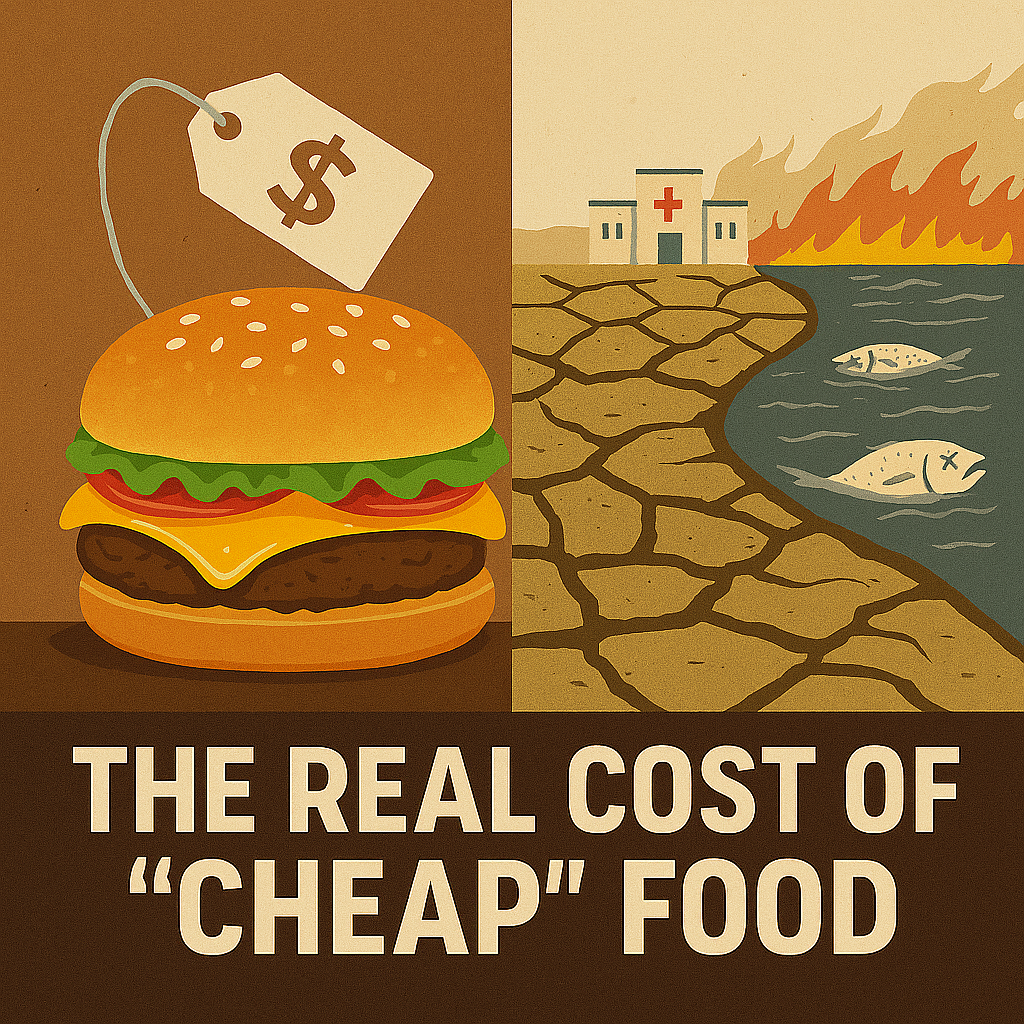Why “Cheap Food” Is the Most Expensive Mistake We Make
We’ve been fed a comforting myth: that industrial farming is necessary to “feed the world.” But scratch the surface, and you’ll find this story is more about feeding profits than people.
Cheap food isn’t cheap. You just pay for it later: in healthcare costs, work productivity loss, dead rivers, eroded soil and much more.
Globally, one-third of all food produced is wasted, while nearly 60% of global agricultural output feeds livestock, biofuels, or ultra-processed junk food. Meanwhile, 43% of adults are overweight or obese (WHO, 2024), and rivers from New Zealand to the U.S are being choked by agricultural runoff. Even in Europe, 70% of soils are degraded (European Commission, 2023). “Local” doesn’t fix this. Damage happens long before the truck arrives.
Local food can still come from mono cropped fields doused in chemicals. “Local” simply means closer, not cleaner. And “organic” alone doesn’t guarantee regenerative outcomes. The problem isn’t just where our food comes from, it’s how we grow it, who benefits, and what systems are incentivized.
As Ronnie Cummins, founder of the Organic Consumers Association, puts it:
“We need to realize that economic justice and the growth of organic and regenerative food and farming … go together.”
WHO highlights the consequences of waste: food loss contributes to malnutrition, climate change, and escalating health costs worldwide.
Regenerative agriculture offers a promising alternative. One powerful example is Patrick Holden, one of the leading voices in global regenerative agriculture. He’s a UK-based organic dairy farmer at Holden Farm Dairy, co-founder and CEO of the Sustainable Food Trust, and former Director of the Soil Association (1995–2010), where he helped grow the UK’s organic market from £50 million to £2 billion.
On his 300-acre Welsh farm, Holden has pioneered practices such as biodynamic farming, cover cropping, and rotational grazing. Restoring soil carbon, biodiversity, and water retention while producing high-quality dairy. Under his leadership, the Sustainable Food Trust has become a global advocacy hub for regenerative systems and true-cost accounting.
Holden’s work proves regenerative agriculture isn’t fringe. It’s feasible, scalable, and essential. His example, alongside other innovative farmers, shows that with the right support, agriculture can shift from extractive to restorative.
Not all farms can switch overnight, but systemic barriers, subsidies, supply chains, uninformed consumer demand, make it harder than it should be. With the right policies and cultural shift, regenerative systems could feed us better, with less waste, better health, and restored ecosystems.
Cheap food isn’t cheap. You just pay later, through healthcare, environmental damage, and social decay.
It’s time we asked different questions.
Not “is it local?” but “does it heal or harm?”
Not “how cheap?” but “at what cost?”
Sustainability isn't a luxury, it's an investment in systems that nourish both people and planet for generations to come.
If you’re interested in clearer strategies, connect with Mr. G - Galeno Chua and check out Business Sustainability Accelerator, our training ecosystem designed to equip sustainability professionals with the tools, clarity, and credibility to lead confidently in real-world business strategy.
Watch our explainer clip: here
